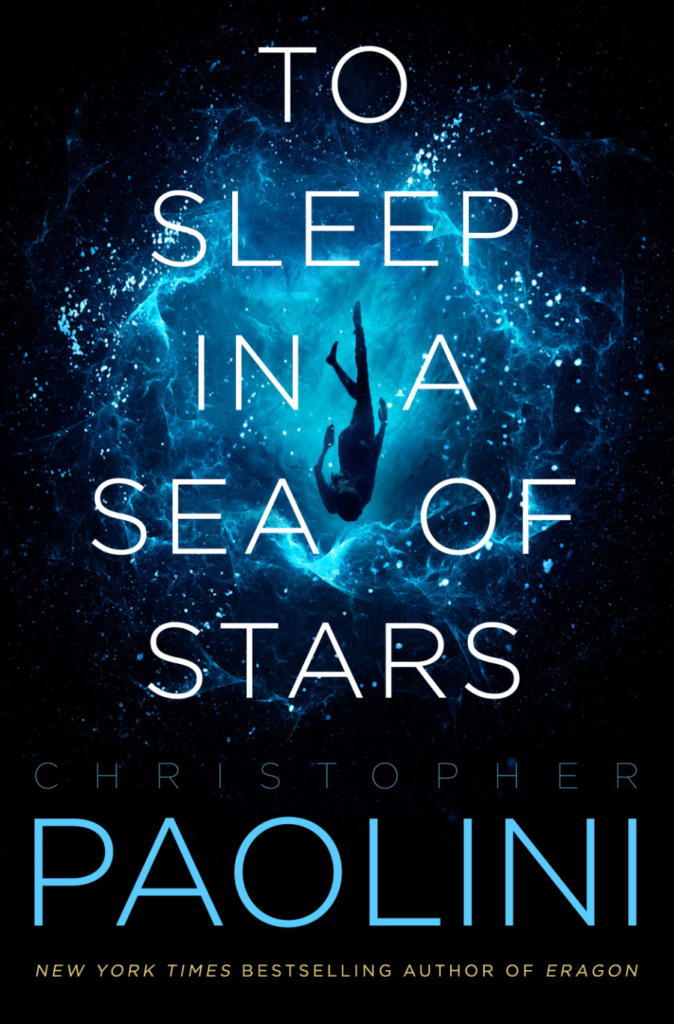The Blurb
During a routine survey mission on an uncolonized planet, xenobiologist Kira Navárez finds an alien relic that thrusts her into the wonders and nightmares of first contact. Epic space battles for the fate of humanity take her to the farthest reaches of the galaxy and, in the process, transform not only her – but the entire course of history.
The Review
It feels a bit like coming full circle to be writing a review for To Sleep in a Sea of Stars. As I mentioned in a recent podcast interview with Christopher Paolini, the first novel I ever voluntarily wrote a book report for was Brisingr back in my senior English class in high school. Now that I’m a blogger this kind of thing is normal but on a certain level, it’s a bit weird to think that people other than my English teacher might read this.
Setting aside the collection of short stories Paolini released in 2018, this is his first novel in nearly a decade. In the world of publishing that’s a long time. To Sleep in a Sea of Stars also switches genres to science fiction, though as a space opera it retains some of that epic adventure that made the Inheritance Cycle so popular.
So, does the new book measure up? Short answer: it depends what you’re looking for.
In many ways, To Sleep in a Sea of Stars shows tremendous growth from the Inheritance Cycle. Paolini’s prose is more polished—though still straightforward and to the point—and the content is more mature. Instead of a simple magic system where words are power, readers are treated with meticulously researched science. Thankfully most of the “crunchier” mechanics of the technology are kept out of the way of the story with a lengthy in-universe whitepaper describing how faster-than-light travel might work tacked on in an appendix.
But storytelling is an art as well as a science, and I fear that some of the emotional moments lacked impact. There were several character deaths that left me unfazed despite picking up hints that I should be moved. Structurally, To Sleep in a Sea of Stars feels like a duology condensed into a single volume, and several of the plot points from that first “book” are largely irrelevant.
I also don’t know if it was necessary to include a scene with Kira exploring how her alien supersuit affected her genitals. Is that realistically something a person would do? Yes. But that doesn’t mean it improved the book or that Paolini is the writer to tackle that particular challenge.
While I did have several critiques, this was overall a fun and compelling read. There’s a loveable space crew, a war against tentacled aliens, and potentially end-of-the-universe stakes. Despite weighing in at more than 900 pages, the story reads quickly and always offers a reason to turn the page.
Selfishly, I’m rather thrilled that To Sleep in a Sea of Stars has already landed a film deal. It has the potential to be massively commercial and give me the chance to revel in my sci-fi geekery with casual acquaintances and coworkers—provided that water cooler conversations are a thing we get to have by then. It’s also nice to see an epic story wrap up in a single volume, and the potential for the broader Fractalverse Paolini is building is off the charts.
So once again: does this measure up to the hype? Mostly, I’d say yes. This isn’t a book that’s trying to win literary awards or go down in science fiction history as a classic. But it shows significant growth in Paolini’s writing chops and sets a rock solid Fractalverse foundation for many more stories in the future.
And perhaps most importantly, it’s a hell of a lot of fun.
Buy To Sleep in a Sea of Stars:


1 thought on “To Sleep in a Sea of Stars by Christopher Paolini”